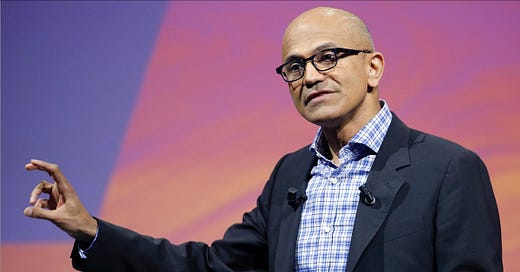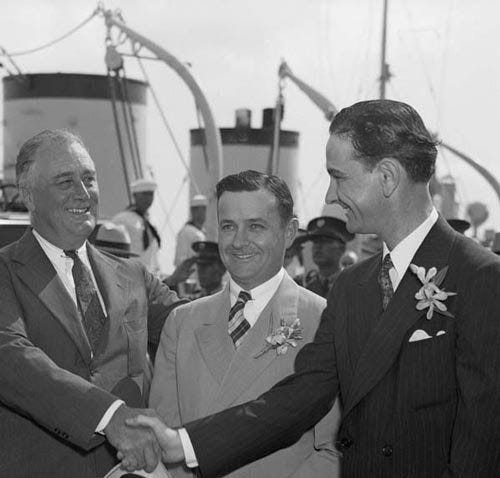Microsoft is expected to announce fiscal Q4 2020 results later today. With a market capitalization of $1.6 trillion and the stock trading near a record high, expectations are likely to be lofty when CEO Satya Nadella addressees investors during the earnings call this afternoon.
Following Microsoft's fiscal 2010 results, I wrote a brief article assessing Steve Ballmer's track record at Microsoft over the prior decade. At that time, investor sentiment was extremely pessimistic. Microsoft stock had delivered negative returns during Ballmer's tenure despite earnings per share increasing dramatically. This was because the valuation assigned to the stock declined precipitously between 2000 and 2010. Microsoft was viewed as "dead money".
At the time, Microsoft was a popular stock among value investors, as I discussed in an article in August 2010. Trading at a bargain basement level of ten times earnings, the stock was too cheap to ignore and many value investors were attracted to the opportunity. The stock remained cheap for several years.
Fast forward ten years and Microsoft is riding high in terms of investor sentiment. Under Nadella's leadership, the company has continued to post strong earnings growth. Value Line estimates that fiscal 2020 EPS will come in at $5.50, an impressive showing compared to EPS of $2.10 in fiscal 2010.
But the real story of the past decade, in terms of the stock price, isn't earnings growth but the valuation investors are assigning to the earnings. Over the ten year span, EPS has increased by ~2.6x but the stock price has gone up by ~9x. Microsoft, as a business, did very well but Microsoft, as a stock, delivered far more due to improved investor sentiment regarding future prospects.
Price always matters. Buyers of Microsoft stock in 2000 suffered negative returns over a decade not because the business performed poorly but because investor sentiment changed. In 2020, sentiment is again positive regarding the business but whether the stock delivers attractive returns between now and 2030 could depend more on sentiment than on how the business performs.
Lighthouse: Women Leading the Way in Finance
The finance industry has traditionally been dominated by men for a variety of reasons and women have found it difficult to break into the field. Lighthouse: Women Leading the Way in Finance is an engaging compilation of the life stories of nineteen women who have found their path and are determined to help others follow in their footsteps. Seventeen year old Maya Peterson wrote the book to inspire and empower women to study “female lighthouses in the world of finance.”
While these women have navigated different paths, what they have in common is the shared experience of being women in a male-dominated field and how they found ways to overcome challenges. Although young women embarking on their careers will find the stories highly relevant, all readers should be able to draw lessons from the book. Those who are established in their careers might be inspired to give a helping hand to younger colleagues who could benefit from some guidance.
Read the full book review on The Rational Walk
Interesting Links
Matt Ridley: How Innovation Works, Part 2, July 15, 2020. Naval Ravikant continues his interview with Matt Ridley regarding Ridley's recently published book, How Innovation Works. Part 1 was posted last week. (Naval Podcast)
Buffett's Former Lieutenant Closes Her First Deal, July 16, 2020. Tracy Britt Cool left Berkshire Hathaway last year to start her own investment firm focusing on small companies. Starting a "mini-Berkshire" is not a new idea but Cool has the benefit of working closely with Buffett over many years. (Business Insider)
Graham Holdings Is A Smaller - and Cheaper - Berkshire Hathaway by Andrew Bary, July 17, 2020. After the Graham family sold The Washington Post newspaper to Jeff Bezos in 2013, they renamed their holding company to Graham Holdings and focused on media and education markets. Longtime Barron's reporter Andrew Bary, who has covered Berkshire for decades, draws some parallels between Graham Holdings and Berkshire Hathaway. (Barron's)
From 1720 to Tesla, FOMO Never Sleeps by Jason Zweig, July 17, 2020. The South Sea bubble of 1720 is the classic story of an investing mania. Zweig explores whether investors in today's markets are any wiser. A common thread between 1720 and 2020 is the perennial fear of missing out. (WSJ)
The Fed Is Going To Buy Stocks by Kevin Coldiron, July 18, 2020. The Federal Reserve has dramatically increased its involvement in fixed income markets in recent months but, so far, has not purchased stocks. Will the Fed join other central banks (such as the SNB) and purchase stocks? More observers are predicting that this could occur soon. (Forbes)
Tyler Cowen: Production Function, July 20, 2020. David Perell interviews Tyler Cowen, an economics professor and a prolific writer on numerous topics. Perell focuses on Cowen's high productivity and how he has been able to publish a blog post every day for the past 17 years. (North Star Podcast)
There is Nothing Wrong With a Traditional Career by Nick Maggiulli, July 21, 2020. While becoming a billionaire working a traditional job is unlikely, Maggiulli points out that the best path for most people to become millionaires is getting a professional degree and diligently saving and investing. (Dollars and Data)
Appearances vs Experiences: What Really Makes Us Happy, July 19, 2020. "In the search for happiness, we often confuse how something looks with how it’s likely to make us feel. This is especially true when it comes to our homes. If we want to maximize happiness, we need to prioritize experiences over appearances." This concept has merit. However, at a time when more people are working from home, aesthetics become more important. (Farnam Street)
Winning Streak of Big Cities Fades With 2020 Crises by Jon Hilsenrath, July 19, 2020. "Coronavirus, anger over policing and strained budgets pack triple punch in cities like New York, Los Angeles and Boston, but don’t count cities out, urban experts say." (WSJ)
Here We Are: 5 Stories That Got Us To Now, by Morgan Housel, July 16, 2020. Housel's long-form essays are always thought provoking: "To have any hope of making sense of what’s happening in 2020, we have to pay attention to a bunch of seemingly unrelated stories that began before anyone had heard of Covid-19. Here are five that seem particularly important." (Collaborative Fund)
Quote of the Week
"I've just met the most remarkable young man. Now I like this boy, and you're going to help him with anything you can."
- President Franklin D. Roosevelt, April 1937
Following his victory in a special election for Congress in 1937, twenty-eight year old Lyndon Baines Johnson met President Roosevelt who was traveling by train through Texas. Johnson made such a strong first impression on Roosevelt that the President gave his top aide, Thomas G. Corcoran, instructions to help Johnson with anything that he might need in Washington D.C. Robert Caro does a masterful job of describing Johnson's early years in Texas and Washington in The Path to Power, the first volume of his Lyndon Johnson biography. The book is more than a biography, however. It is a history of the Texas Hill Country and a survey of the broader Depression-era landscape in which Johnson rose to power.
One of Johnson's talents was ingratiating himself with older men in positions of power who could help him in the future. Johnson delivered for his district using his connections in the Roosevelt administration, playing an instrumental role in the electrification of rural areas, and gained the loyalty of voters. His meteoric ascent was only beginning.
As I read this book, I kept thinking that the intrigues of the Netflix drama, House of Cards, were nothing compared to real life Washington D.C. in the 1930s.
Copyright, Disclosures, and Privacy Information
Nothing in this newsletter constitutes investment advice and all content is subject to the copyright and disclaimer policy of The Rational Walk LLC.
Your privacy is taken very seriously. No email addresses or any other subscribers information is ever sold or provided to third parties. If you choose to unsubscribe at any time, you will no longer receive any further communications of any kind.





